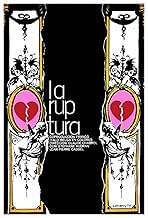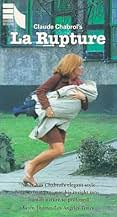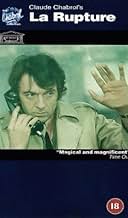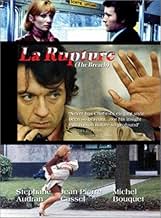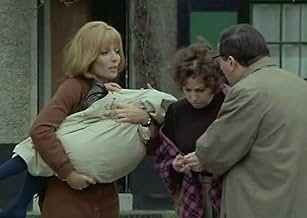NOTE IMDb
7,2/10
2,1 k
MA NOTE
Charles Régnier, père de famille toxicomane, blesse son jeune fils dans un accès de rage. Sa femme Hélène prend peur et le quitte. Désireux de récupérer, le père de Charles tente de récupére... Tout lireCharles Régnier, père de famille toxicomane, blesse son jeune fils dans un accès de rage. Sa femme Hélène prend peur et le quitte. Désireux de récupérer, le père de Charles tente de récupérer son petit-fils.Charles Régnier, père de famille toxicomane, blesse son jeune fils dans un accès de rage. Sa femme Hélène prend peur et le quitte. Désireux de récupérer, le père de Charles tente de récupérer son petit-fils.
- Réalisation
- Scénario
- Casting principal
- Récompenses
- 1 nomination au total
Margo Lion
- Mme Humbert - la première parque
- (as Margot Lion)
Avis à la une
Like Graham Greene's so-called entertainments, this film veers into melodrama, but it never seemed unreal to me and was certainly a pleasure to watch. The highlight for me was the machinations of the lowlife hired to bring the heroine down. I also got drawn into the setting of the rooming house and the warmth of the more innocent people that give strength to the heroine. Acting, as always in a Chabrol film, is superb.
6sol-
Intent on winning custody of their grandson who their son injured while stoned, an upper class couple set out to discredit and defame their daughter-in-law in this odd thriller from Claude Chabrol. Stéphane Audran plays the daughter-in-law, however, the majority of the film is curiously not told from her point-of-view but rather the perspective of a man hired to discredit her, played by Jean-Pierre Cassel. As such, the film does derive any juice from Audran wondering whether or not she is going insane (a la 'Gaslight'), which would not necessarily be a problem, except that Cassel's schemes are so strange and convoluted that it is obvious that they will fail before he even puts them into action. His attempts to spread gossip around the boarding house where Audran is staying are fairly credible. At his most incompetent though, Cassel tries to force Audran to eat a drugged candy (!) while his most bizarre plan involves his girlfriend wearing a wig and fondling Audran's landlady's mentally challenged daughter, expecting that the girl will mistake the wigged woman for Audran! With a perfectly terse music score and lots of fluid camera movements, 'La Rupture' still remains very watchable despite the messy plot, and the LSD-induced scenes towards the end need to be seen to be believed. There is also a lot of memorable weirdness throughout, such as Cassel's girlfriend always being nude (or partially naked) and her fondling scene, complete with an X-rated Satanic film projected in a darkened room might well rate as the very strangest sequence that Chabrol ever committed to celluloid.
Though I've always found it difficult to stomach the parallels between Hitchcock and Chabrol (another user on this site highlighted the similarities Chabrol shares with Clouzot, a comparison that I concur with, Chabrol sharing Clouzot's moral ambiguity/overall weltschmerz), it would be foolhardy to deny the broad Hitchcockian flourishes here. Dipped and dredged in LSD, the hallucinatory sequences in here nod reverently to "Vertigo" and "Marnie". Yet, unlike some hitchcock staples (no gripes with Hitch here, he is after all my all time favorite director), there is nary a hint of escapism here. Instead, Chabrol plunges us head-first into the depths of modern complacency, a project that we are all complicit in.
The story itself is another virulently acerbic "thriller of manners" for Chabrol, capturing with Flaubertian honesty the farce upon which class distinctions are built. Other than Clouzot, I've always felt that Chabrol's work comes closest to Bunuel's (no surprise that Cassel and Audran would also feature in Discreet Charm Of The Bourgeoisie)- he brings a blowtorch to insipid, self-satisfied, hypocritical civilization, and dares to gaze into the vacuous abyss beneath. Like Bunuel and Fassbinder, he does this with consummate style and infuses his films with cruelly ironic wit.
Chabrol's films are always unnerving to watch because they come too close for comfort, and never allow us to be self-satisfied. He asks some terribly important questions: at what price are bourgeois myths of propriety, morality and civilization bought? In "The Unfaithful Wife", murder is necessary to sustain the idyll, while this movie offers a profound dissection of bourgeois identity- in order for bourgeois "decorousness" and privilege to survive, it must posit an Other, the sordid, vulgar, ill-educated boor, even if it doesn't exist. Throughout "La Rupture" the viewer witnesses the creation of these supposed "absolutes", the unfurling of the absurd narrative that legitimizes bourgeois entitlement- sully, tar and feather the peasant, the Other. Like homophobia, class prejudice is only an expression of the precariousness of identity, without an opposite to define oneself against, the suppositions invariably crumble.
Chabrol is an acutely intelligent, courageous and singularly brilliant film maker. Don't miss this deconstructive masterpiece...as an examination of class, I think only "La Ceremonie" would surpass this one.
ps i can't help but wonder if the eccentric, insular boarding-house here is an homage to balzac's maison vauqeur in his incomparable "Old Goriot"- both the altruistic doctor (Bianchot) and the moustachioed, absurdly eloquent tempter (Vautrin) are parodied/mirrored here
The story itself is another virulently acerbic "thriller of manners" for Chabrol, capturing with Flaubertian honesty the farce upon which class distinctions are built. Other than Clouzot, I've always felt that Chabrol's work comes closest to Bunuel's (no surprise that Cassel and Audran would also feature in Discreet Charm Of The Bourgeoisie)- he brings a blowtorch to insipid, self-satisfied, hypocritical civilization, and dares to gaze into the vacuous abyss beneath. Like Bunuel and Fassbinder, he does this with consummate style and infuses his films with cruelly ironic wit.
Chabrol's films are always unnerving to watch because they come too close for comfort, and never allow us to be self-satisfied. He asks some terribly important questions: at what price are bourgeois myths of propriety, morality and civilization bought? In "The Unfaithful Wife", murder is necessary to sustain the idyll, while this movie offers a profound dissection of bourgeois identity- in order for bourgeois "decorousness" and privilege to survive, it must posit an Other, the sordid, vulgar, ill-educated boor, even if it doesn't exist. Throughout "La Rupture" the viewer witnesses the creation of these supposed "absolutes", the unfurling of the absurd narrative that legitimizes bourgeois entitlement- sully, tar and feather the peasant, the Other. Like homophobia, class prejudice is only an expression of the precariousness of identity, without an opposite to define oneself against, the suppositions invariably crumble.
Chabrol is an acutely intelligent, courageous and singularly brilliant film maker. Don't miss this deconstructive masterpiece...as an examination of class, I think only "La Ceremonie" would surpass this one.
ps i can't help but wonder if the eccentric, insular boarding-house here is an homage to balzac's maison vauqeur in his incomparable "Old Goriot"- both the altruistic doctor (Bianchot) and the moustachioed, absurdly eloquent tempter (Vautrin) are parodied/mirrored here
10pyamada
The parents of Charles, the loser and addict husband, who are impossibly bourgeoise, begin the cycle of dishonesty and class warfare, in their attempt to gain custody of the child. Helene is followed, harassed and finally drugged; her fear, paranoia and her hallucinations are "real" and very powerful. This is Chabrol at his best, giving a scathing critique of the whims and overall avarice of the bourgeoise and upper class while showing you the terrible fate of a very mortal character who is trying to escape from the mistake of marrying wealth and position.
Of all the great films that Claude Chabrol made; The Breach is one of the most often praised, and that is not surprising at all as this film sees the great French director at the absolute top of his game and deserves every good word said about it! As ever with Chabrol, what we have here is a film that thrills on the surface but has much more going on beneath it. The characters are undoubtedly the most important thing about the film; and the director ensures that each one is brought to life effectively and believably, and this ensures that the film's many substantial points can come through. The film begins with a surreal sequence that could be something out of a zombie movie, as we see a dishevelled man emerge from the bathroom in just a robe and proceed to attack his wife Hélène. His attention soon moves on to the small boy and after putting the kid in hospital, the wife decides to file for a divorce. However, things are not so simple as her husband's father happens to be one of the richest and most powerful men in town, so he won't let Hélène take his grandson from him without a fight...and hires the immoral Paul Thomas to dig up some dirt on Hélène.
The film doesn't contain a great deal of excitement in the common thriller sense, but Chabrol keeps his audience on the edge of their seats by way of the characters and the atmosphere. The film centres on a boarding house and the people that live there; and the interaction between them makes up the bulk of the film. The main theme on display is an attack against the rich; this comes through plainly and obviously through the character of Ludovic Régnier; a man who has enough money to always get what he wants and not care about who gets trampled in the process. The outlook of the film is very bleak all round and Chabrol seems keen to show the dark side of human nature as much as possible. The central plot line, which involves a man trying to prove that an upstanding woman is an unfit mother by any means necessary, is very bleak in the way it plays out. As ever with Chabrol, the acting is excellent and he has put together a great cast here that includes his then wife and frequent muse, the beautiful Stéphane Audran in the lead role and a support cast that features superb performances from the likes of Jean-Pierre Cassel and Michel Bouquet. The film has a very unique style that fluctuates throughout; as mentioned, the first five minutes or so almost seem like something out a zombie movie and then it moves into more familiar Chabrol territory before changing again for the climax as the director gives us a very strange and striking hallucination sequence. Overall, this is an excellent thriller that comes highly recommended and I may even rate it as Chabrol's best.
The film doesn't contain a great deal of excitement in the common thriller sense, but Chabrol keeps his audience on the edge of their seats by way of the characters and the atmosphere. The film centres on a boarding house and the people that live there; and the interaction between them makes up the bulk of the film. The main theme on display is an attack against the rich; this comes through plainly and obviously through the character of Ludovic Régnier; a man who has enough money to always get what he wants and not care about who gets trampled in the process. The outlook of the film is very bleak all round and Chabrol seems keen to show the dark side of human nature as much as possible. The central plot line, which involves a man trying to prove that an upstanding woman is an unfit mother by any means necessary, is very bleak in the way it plays out. As ever with Chabrol, the acting is excellent and he has put together a great cast here that includes his then wife and frequent muse, the beautiful Stéphane Audran in the lead role and a support cast that features superb performances from the likes of Jean-Pierre Cassel and Michel Bouquet. The film has a very unique style that fluctuates throughout; as mentioned, the first five minutes or so almost seem like something out a zombie movie and then it moves into more familiar Chabrol territory before changing again for the climax as the director gives us a very strange and striking hallucination sequence. Overall, this is an excellent thriller that comes highly recommended and I may even rate it as Chabrol's best.
Le saviez-vous
- AnecdotesClaude Chabrol once stated that the bus scene where Hélène (his wife Stéphane Audran) tells her family's story to the lawyer (Michel Duchaussoy) was the occasion when he finally thought that Stéphane had become an actress.
- Citations
Opening Title Card: [from the French] But what thick night suddenly surrounds me? JEAN RACINE
- ConnexionsReferences Les Géants de l'Ouest (1969)
Meilleurs choix
Connectez-vous pour évaluer et suivre la liste de favoris afin de recevoir des recommandations personnalisées
- How long is The Breach?Alimenté par Alexa
Détails
- Durée
- 2h 4min(124 min)
- Mixage
- Rapport de forme
- 1.85 : 1
Contribuer à cette page
Suggérer une modification ou ajouter du contenu manquant

